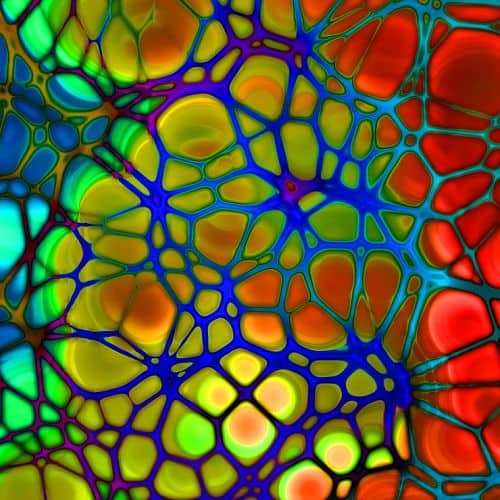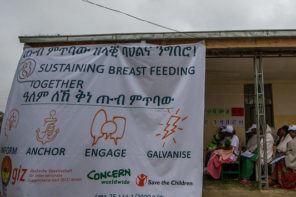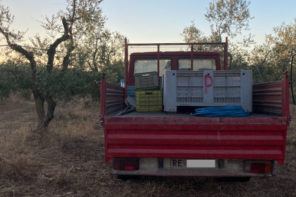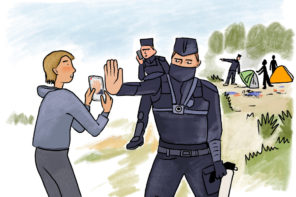Over the last decades, ‘moving subjects’ have captivated—if not demanded—more of anthropologists’ attention. As one of the forefront communicators of social phenomena as they are lived ‘elsewhere’, we have seen a fundamental shift in the way we understand and approach ‘culture,’ society, and identity. Social groups are now far from being seen as static and their lives not necessarily as sedentary as early anthropological thinking have suggested. Akhil Gupta and James Ferguson (1992) have timely enough urged us to think “beyond culture” in our queries and to instead immerse ourselves in the spaces, localities and borderlands in which peoples’ lives intersect.
We thus increasingly search for these intersections that are created through movement, fluidity and circulation of peoples, goods, and ideas in our work. We ask how they influence, trouble or enhance individual and collective lives and identities. In particular, we seek to understand the frictions and implications that may occur along certain changes in societies. As often,
the same processes that propel people to move produce the contrary, namely, immobility, exclusion and disconnection.
In April 2015, PACSA, the Peace and Conflict Studies in Anthropology network of EASA, put forward a call for papers for its 5th bi-annual meeting on the topic of Im/mobility in the context of peace, violence and conflict. The response was enormous. Anthropologists and other scholars from international relations, peace and conflict studies from different parts of the world registered to take part. Not only did the topic resonate with each of the participants’ work, but also with the concerning major world events that were unfolding. The war in Syria at that time was already taking its toll, and by the time the conference took place in September in Frankfurt, massive flows of refugees were landing ashore in Europe after having risked their lives crossing dangerous seas in overcrowded boats to escape from the brutality of war. It is a refugee crisis the world hasn’t seen since the Holocaust and with so many deaths during the journeys taken. The question of how to respond to a crisis of that scale, both in immediate and long terms, was in the public’s mind.
The theme of im/mobility and its underlying dynamics and implications in times of conflict and peace was never more relevant to discuss.
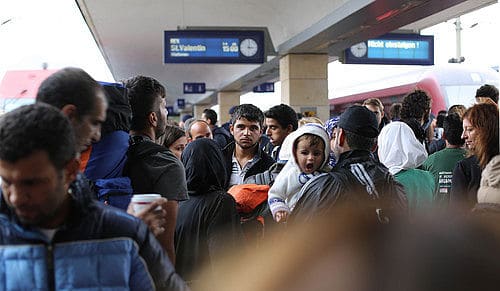
Photo by Josh Zakary (flickr, CC BY-NC 2.0)
Co-hosted by the Peace Research Institute Frankfurt (PRIF) and the Department of Social and Cultural Anthropology of the Goethe University, around 40 participants engaged in stimulating discussions addressing the mobility-conflict nexus from a variety of perspectives, among them displacement, memory and identity, transnational networks, security and border regimes, activism and state violence. The two-day conference took as its basic premise the notion that im/mobility can be on the one hand products and generators of conflicts, but on the other enabling factors for peace advocacy and cross-border interventions. Tobias Kelly, Head of Social Anthropology at the University of Edinburgh, delivered the keynote lecture on the “Immobility of Human Rights,” discussing the unequal distribution and mobility of human rights claims.
Participants took turns in presenting their case studies, taking us from one continent to another, from a context of violent war in one country to cross-border reconciliation efforts elsewhere, all within a very challenging time limit of 15 minutes each—which many took as a ‘mere suggestion.’ That, however, did not hold the participants back. Deep conversations about the subject followed well into coffee breaks and the ‘traditional’ conference dinner. Collaboration initiatives have fruited as a result and are underway.
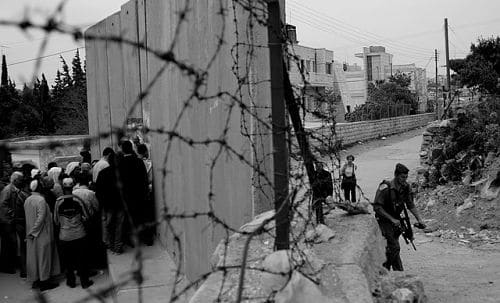
Photo by Kashfi Halford (flickr, CC BY-NC 2.0)
Discussed in the conference included the ways in which images, ideas of security, and ‘universal’ values of human rights travel and create a space where ‘local’ and ‘Western’ views confront, if not fuse, with each other. Other papers analyzed the presence of the state in the form of restricting mobility of particular minorities, including refugees and marginalized ethnic groups. An important question was raised, therefore, in relation to the power asymmetries embedded in each case.
Who benefits from certain policies, deals, and arrangements made to impact peoples’ im/mobility?
In terms of border regimes, papers that dealt particularly with the Palestinian and Israel border explored the complex hybridity of not only identities but also of social spaces. The latter was further explored in post-conflict settings in which shared spaces provided opportunities for dialogue between former opponents and peace activism. Finally, im/mobility was discussed in terms of its experience at the everyday level, between ‘newcomers’ and host communities. Dynamics of conviviality but also conflict that surround im/mobility were analyzed to understand the processes of de/construction of collective identity.
Overall, the conference brought together a rich array of ethnographic work focusing on peace and violence, bringing about new important insights for theoretical and research considerations. Im/mobility can result in gains and losses of power, identity and other sorts of capital. As changes in access to mobility dramatically affect multiple aspects of life, looking at im/mobility is a promising point of departure to the study of social change. Ultimately, the conference had sought to explore how im/mobilities are central to the constellations of power; to the creation of identities and the everyday with a focus on the way these processes work within situations of conflict and peace.
The PACSA board consists of Erella Grassiani, Andreas Hackl, Michael Lidauer and Nerina Weiss.

